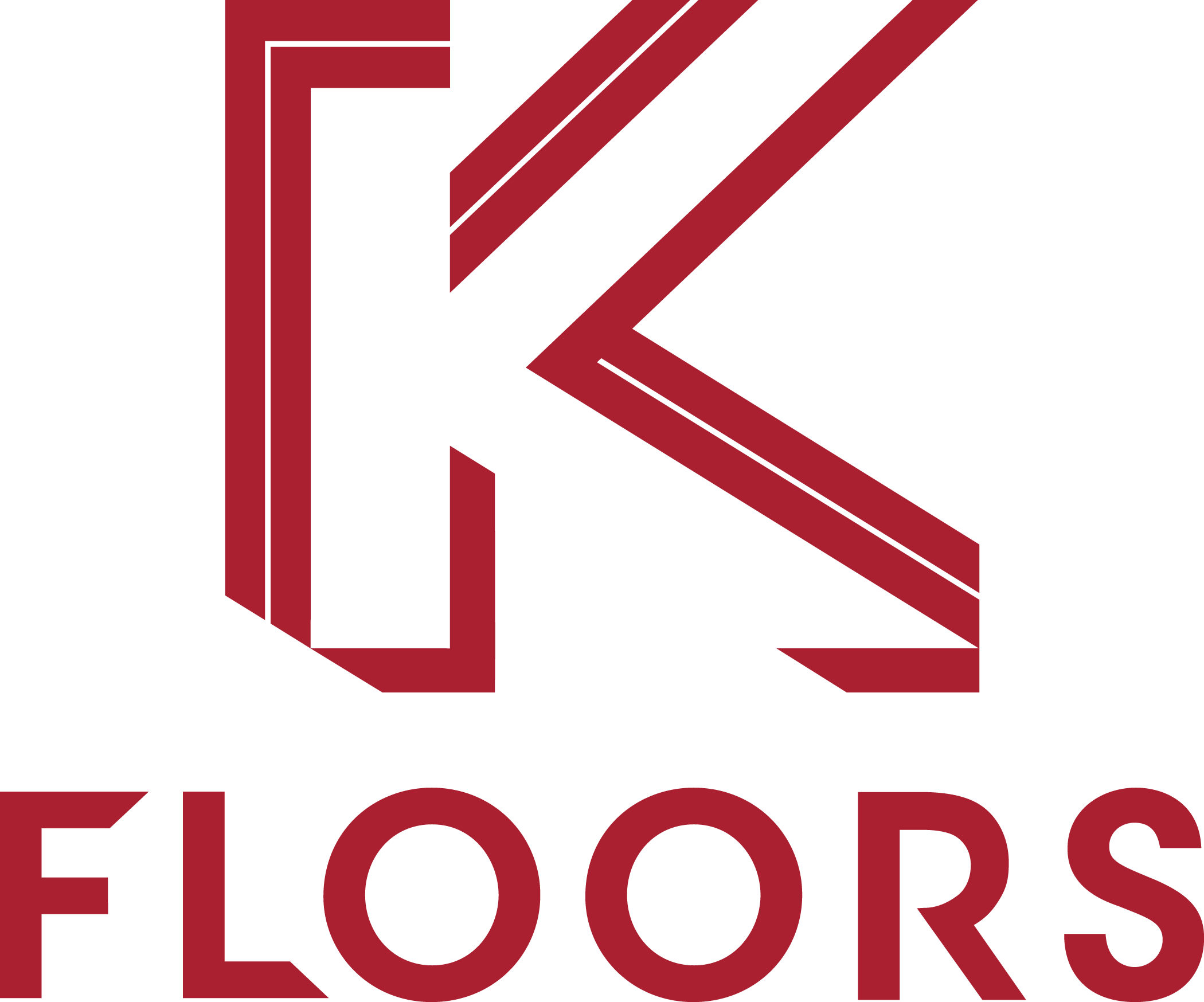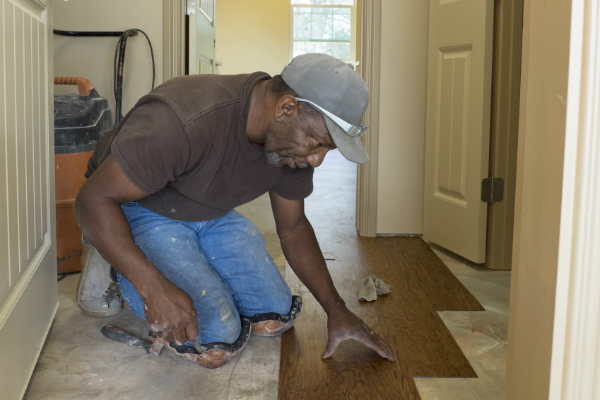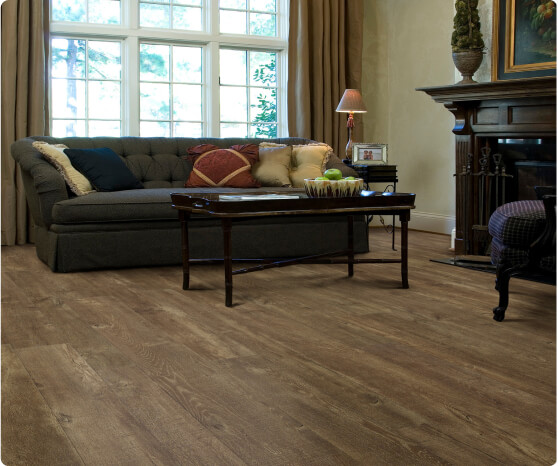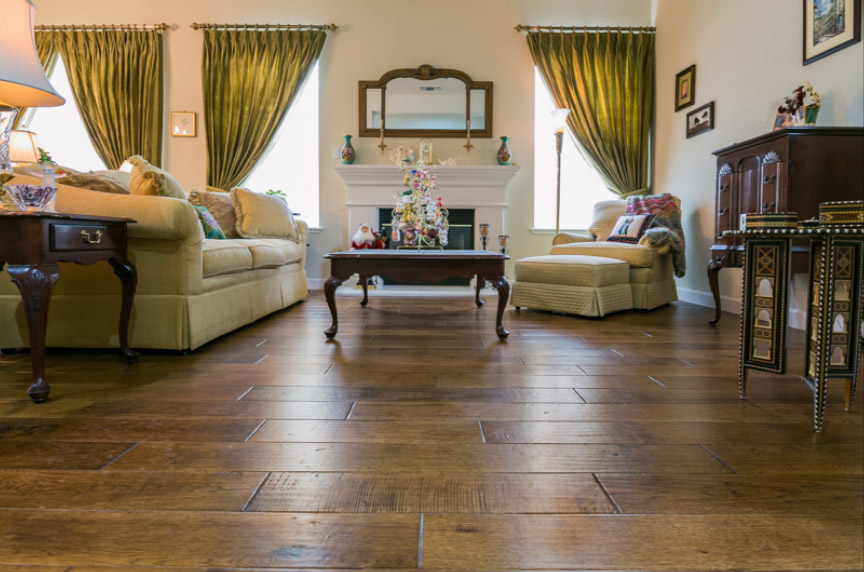
Curious about upgrading your kitchen flooring? Wondering if stone-polymer composite vinyl plank flooring is the right choice? In this guide, we delve into the features, benefits, and considerations of this popular flooring option.
Stone-polymer composite vinyl plank flooring offers durability, water resistance, and easy maintenance, making it ideal for high-traffic areas like kitchens. We’ll explore its affordability, installation process, and how it stands up to spills and stains. Stay tuned to discover if this modern flooring solution aligns with your kitchen renovation needs.
Table of Contents
ToggleUnderstanding Flooring Types
SPC Explained
SPC, or stone-polymer composite, flooring is a type of rigid core flooring known for its durability and water resistance. Key features include a dense stone polymer core and a robust wear layer. This flooring option is perfect for high-traffic areas like kitchens due to its resilience.
The composition of SPC flooring consists of limestone powder, polyvinyl chloride, and stabilizers. These materials are compressed under high pressure to create a solid core that can withstand heavy use. Benefits of choosing SPC for your kitchen include scratch resistance, waterproof properties, and easy maintenance.
LVP Explained
LVP, or luxury vinyl plank, flooring offers a versatile and cost-effective alternative to traditional hardwood floors. Its characteristics include a realistic wood look, soft underfoot feel, and noise reduction properties. The layers that make up LVP flooring consist of a wear layer, printed vinyl layer, core layer, and backing layer.
Distinguishing LVP from SPC flooring lies in the construction. While both are resilient and durable, LVP has a flexible vinyl core that provides comfort underfoot. The differences between the two types extend to installation methods, with LVP being more suitable for DIY projects due to its click-lock system.
Core Differences
The core disparities between SPC and LVP flooring primarily revolve around the core materials used in their construction. SPC flooring features a stone polymer composite core that offers unmatched stability and rigidity. On the other hand, LVP flooring boasts a vinyl core that provides flexibility and comfort.
Core materials significantly impact the performance of both types of flooring. SPC’s stone-based core ensures superior dent resistance and dimensional stability, making it ideal for areas prone to moisture exposure like kitchens. In contrast, LVP’s vinyl core offers a softer feel underfoot but may not be as resistant to heavy impacts.
Comparing the rigidity and stability of SPC and LVP cores reveals that SPC flooring excels in areas requiring high durability and water resistance. Its rigid core makes it less susceptible to temperature changes and provides enhanced protection against dents and scratches. However, LVP’s flexible core offers a more comfortable walking experience but may not be as resilient in demanding environments.
Comparing SPC and LVP
Core Material
The stone-plastic composite (SPC) core in flooring consists of limestone powder, polyvinyl chloride, and stabilizers. On the other hand, luxury vinyl plank (LVP) flooring features a core made of PVC composites and sometimes added minerals for strength. The composition of the core directly impacts the durability and water resistance of the flooring.
Thickness and Rigidity
SPC flooring is known for its thickness, typically ranging from 3.2mm to 7mm, providing sturdiness and rigidity. In comparison, LVP flooring tends to be thinner, usually between 2mm to 5mm, offering flexibility but slightly less durability. The thickness and rigidity of the flooring contribute significantly to its overall performance, especially in high-traffic areas like kitchens.
Installation Process
Installing SPC flooring involves several steps, including preparing the subfloor, acclimating the planks, laying down underlayment, and clicking the planks together. Key steps in installing SPC flooring include ensuring a clean and level subfloor, allowing for expansion gaps, and using appropriate tools for cutting and fitting. When installing SPC in kitchens, it’s crucial to apply a waterproof sealant around edges and seams to prevent water damage.
Water Resistance
SPC flooring boasts exceptional water resistance, making it ideal for areas prone to moisture like kitchens. This quality not only enhances the longevity of the flooring but also simplifies maintenance by allowing easy cleanup of spills without worrying about damage. The benefits of water-resistant flooring in kitchens include peace of mind against water-related accidents and long-term durability in a high-moisture environment.
Sound Absorption
One significant advantage of SPC flooring is its superior sound absorption properties, reducing noise levels within the room. Compared to LVP flooring, SPC offers better sound insulation due to its denser core material. The impact of sound absorption on kitchen comfort is substantial as it creates a quieter environment for cooking and dining activities.
Price Points
When it comes to pricing, SPC flooring tends to be slightly more expensive than LVP due to its enhanced durability and water resistance features. Factors contributing to this price difference include the quality of materials used in the core and the overall construction of the planks. Despite the higher price point, SPC provides excellent value with its long-lasting performance and low maintenance requirements.
Advantages of SPC Flooring
Water Resistance
SPC flooring is highly water-resistant, making it ideal for areas prone to moisture like kitchens and bathrooms. It can withstand spills without warping.
In comparison to traditional hardwood flooring, SPC flooring offers superior water resistance due to its stone-polymer composition.
SPC flooring’s exceptional water resistance makes it a perfect choice for kitchens where spills are common, ensuring long-lasting quality.
Durability
SPC flooring excels in high-traffic areas, maintaining its appearance even under heavy use. It resists scratches and dents effectively.
When compared to Luxury Vinyl Plank (LVP) flooring, SPC flooring proves to be more durable and resilient against wear and tear.
In kitchen settings, the durability of SPC flooring shines through, withstanding the demands of daily cooking activities and foot traffic.
Sound Proofing
SPC flooring provides excellent soundproofing qualities, reducing noise transmission within the room and to lower levels. It enhances comfort.
Compared to LVP flooring, SPC flooring offers superior soundproofing capabilities, creating a quieter environment in busy areas like kitchens.
Effective soundproofing in kitchen spaces is crucial for minimizing noise disruptions during meal preparation and gatherings.
Disadvantages of SPC Flooring
Comfort and Warmth
SPC flooring offers limited comfort and warmth due to its rigid nature compared to traditional options. While it provides durability, it lacks the softness of materials like carpet. In contrast, LVP flooring tends to offer more cushioning and warmth underfoot, enhancing the overall comfort in a kitchen setting. The choice between SPC and LVP flooring can significantly impact the cozy atmosphere of your kitchen.
Susceptibility to Scratches
SPC flooring is generally highly resistant to scratches, making it a durable option for high-traffic areas like kitchens. Compared to LVP flooring, SPC is less prone to visible scratches and dents due to its dense core material. To prevent scratches on kitchen floors, consider using felt pads under furniture legs, avoiding dragging heavy items, and promptly cleaning up spills to maintain the floor’s pristine condition.
Moisture Sensitivity
LVP flooring exhibits higher moisture sensitivity compared to SPC flooring. While both are water-resistant, LVP may be more susceptible to water damage over time if exposed to excessive moisture. In kitchen settings where spills are common, choosing SPC over LVP can provide added protection against moisture-related issues. Proper sealing and maintenance can help mitigate the risks associated with moisture sensitivity in kitchen flooring.
Why Choose SPC for Your Kitchen
High Traffic Tolerance
SPC flooring stands out for its exceptional high traffic tolerance, making it ideal for busy kitchen spaces. Its rigid core construction ensures durability even in areas with heavy foot traffic. This durability sets SPC apart from traditional laminate or hardwood flooring options.
In comparison, SPC flooring surpasses other types in terms of withstanding wear and tear in high-traffic zones. The dense core material of SPC makes it highly resistant to dents, scratches, and damage caused by frequent use. For a kitchen setting where constant movement and activities occur, this feature is crucial for maintaining the floor’s appearance over time.
The importance of high traffic tolerance in kitchen flooring cannot be overstated. Kitchens are often bustling hubs of activity, with spills, dropped utensils, and continuous foot traffic being common occurrences. Opting for SPC flooring ensures that your kitchen floor remains in top condition despite the daily challenges it faces.
Moisture and Spill Resistance
Spill resistance is a key benefit of SPC flooring, making it an excellent choice for kitchens where accidental spills are inevitable. Unlike traditional hardwood floors that can warp or stain when exposed to moisture, SPC planks are designed to repel liquids effectively.
Comparing moisture and spill resistance between SPC and LVP (Luxury Vinyl Plank) flooring, SPC comes out on top due to its superior water-resistant properties. While LVP also offers some level of moisture resistance, SPC’s core composition provides an added layer of protection against water damage.
Spills can have damaging effects on different types of flooring materials. For instance, hardwood floors can suffer from warping or staining when exposed to liquids, while carpets may retain moisture and lead to mold growth. By choosing SPC flooring for your kitchen, you mitigate the risks associated with spills and ensure long-lasting performance.
Easy Maintenance
Maintaining SPC flooring is effortless, requiring simple cleaning routines to keep it looking pristine. Regular sweeping or vacuuming followed by mopping with a damp cloth is usually sufficient to remove dirt and maintain the floor’s shine. The protective wear layer on SPC planks helps resist stains and scuffs.
When compared to LVP flooring, SPC requires minimal maintenance, as it is more resistant to scratches and impacts due to its sturdier core structure. To ensure the longevity of your kitchen floors, consider using felt pads under furniture legs, promptly wiping up spills, and avoiding harsh cleaning chemicals that could damage the floor’s finish.

Considerations for Choosing Flooring
Kitchen Requirements
When selecting flooring for your kitchen, prioritize durability, water resistance, and easy maintenance. Ensure the flooring can withstand high traffic and spills. SPC flooring excels in these aspects due to its composition and protective wear layer.
SPC flooring’s rigid core makes it ideal for kitchens, offering stability and resistance to dents and scratches. Its waterproof nature prevents moisture damage, crucial in a kitchen setting prone to spills. Consider the thickness of the wear layer for added protection against stains and wear.
Key considerations for choosing kitchen flooring include ease of cleaning, slip resistance, and comfort underfoot. SPC flooring meets these criteria, providing a comfortable surface to stand on while cooking. Its non-slip surface enhances safety in a busy kitchen environment.
Budget Constraints
Budget constraints play a significant role in determining the flooring choice for your kitchen. SPC and LVP flooring options are cost-effective alternatives that offer durability without breaking the bank. While SPC is slightly more expensive than LVP, both provide excellent value for money.
SPC flooring’s long-term durability and low maintenance requirements make it a budget-friendly flooring solution. Its ability to mimic natural materials like wood or stone adds aesthetic appeal without the high price tag. Consider the installation costs when evaluating overall affordability.
Pros:
- Durable and long-lasting
- Easy to maintain
- Water-resistant
Cons:
- Higher initial cost compared to some other options
- Professional installation may be required
Personal Preferences
Personal preferences play a crucial role in selecting the right kitchen flooring. Consider factors such as color, texture, and design that align with your style and taste. Whether you prefer a modern, rustic, or traditional look, choose flooring that complements your overall kitchen aesthetic.
When deciding based on individual tastes, explore various options such as wood-look SPC planks or stone-look tiles to match your preferred design theme. Pay attention to details like grain patterns, colors, and finishes that resonate with your personal style. Harmonize the flooring choices with your existing decor for a cohesive look.
Installation Tips
Preparing for Installation
To prepare for SPC flooring installation, start by clearing the kitchen area of all furniture and appliances. Next, ensure the subfloor is clean, level, and dry. Proper preparation is crucial as it ensures a smooth and durable installation. Before starting, measure the room to determine the amount of flooring needed.
It’s essential to check for any imperfections in the subfloor that may need to be addressed before installation. Acclimate the flooring to the room’s temperature and humidity levels for at least 48 hours. A checklist for preparing the kitchen floor includes cleaning, leveling, measuring, and acclimating the flooring.
- Clear the kitchen area
- Ensure subfloor cleanliness
- Measure the room
- Check for imperfections
- Acclimate the flooring
Professional vs DIY
When deciding between professional installation or DIY, consider your skill level and the complexity of the project. Professional installation guarantees expertise and precision but comes at a cost. On the other hand, DIY can be cost-effective but requires time, effort, and attention to detail.
Professional installation offers quality assurance and saves you from potential errors. However, if you have experience with flooring projects and feel confident in your skills, DIY can be a rewarding option. For larger kitchens or intricate designs, professional installation is recommended. For smaller areas or simple layouts, DIY can be a suitable choice.
- Professional installation: expertise, precision
- DIY: cost-effective, time-consuming
- Consider skill level and project complexity
- Quality assurance with professionals
- Confidence in DIY skills
Maintenance and Care
Regular Cleaning
Regular cleaning is essential for maintaining the quality and longevity of stone-polymer composite (SPC) vinyl plank flooring in your kitchen. Frequent cleaning helps to prevent dirt, grime, and spills from causing damage over time. To effectively clean SPC flooring in kitchens, sweep or vacuum regularly to remove debris that can scratch the surface. Use a damp mop with a mild detergent solution to wipe away stains and spills promptly.
- Sweeping or vacuuming removes dirt and debris that can scratch the floor.
- Using a damp mop with a gentle detergent solution helps to clean spills effectively.
Consistent cleaning not only keeps your SPC kitchen floors looking fresh but also extends their lifespan. By removing dirt and spills promptly, you prevent them from settling into the flooring and causing long-term damage. Regular maintenance ensures that your investment in SPC flooring remains durable and visually appealing for years to come.
Preventing Damage
To prevent damage to your SPC flooring in kitchens, consider placing protective mats at entrances to trap dirt and moisture before it reaches the floor. Avoid dragging heavy furniture across the flooring to prevent scratches and dents. Spills should be cleaned up immediately to avoid staining or warping of the SPC planks.
- Placing protective mats at entrances helps trap dirt and moisture.
- Avoid dragging heavy furniture to prevent scratches and dents on the flooring.
Common causes of damage to SPC kitchen flooring include abrasive materials, high heels, and sharp objects. By being mindful of these factors and taking proactive measures, such as using furniture pads and area rugs, you can protect your investment in SPC flooring. Prevention is key to maintaining the beauty and functionality of your kitchen floors for years to come.
Final Remarks
In choosing flooring for your kitchen, consider the durability and water resistance of Stone-Polymer Composite Vinyl Plank (SPC) flooring. It offers a balance of benefits like easy maintenance, longevity, and style versatility. Despite some drawbacks, SPC remains a practical choice for your kitchen due to its resilience and aesthetic appeal. Remember to weigh your options carefully based on your needs and preferences.
Make an informed decision for your kitchen flooring by evaluating the pros and cons of SPC against other options. Your kitchen’s functionality and visual appeal are crucial factors to consider when selecting the right flooring material. Ensure you prioritize quality, practicality, and style to create a space that suits your lifestyle.
Frequently Asked Questions
1. Is stone-polymer composite vinyl plank flooring durable for kitchen use?
Stone-polymer composite (SPC) flooring is highly durable and ideal for kitchens due to its resistance to moisture, scratches, and stains. Its robust construction ensures longevity in high-traffic areas like the kitchen.
2. What are the key differences between SPC and LVP flooring?
SPC flooring is more rigid and stable than traditional luxury vinyl plank (LVP) flooring. SPC has a stone-based core, offering enhanced durability, while LVP has a softer, more flexible composition.
3. How does SPC flooring benefit kitchen spaces?
SPC flooring in kitchens provides a waterproof and easy-to-clean surface that resists spills and stains. Its durability makes it suitable for heavy foot traffic, ensuring long-lasting beauty in your kitchen.
4. Are there any drawbacks to using SPC flooring in the kitchen?
While SPC flooring offers numerous benefits, it can feel colder underfoot compared to other materials. Improper installation may lead to visible imperfections or noise issues in the kitchen environment.
5. What factors should I consider when choosing SPC flooring for my kitchen?
Consider factors such as color and design options, thickness, wear layer, and installation method. Ensure the selected SPC flooring meets your aesthetic preferences while also providing the necessary durability for your kitchen space.
Struggling To Find The Perfect Stone-Polymer Composite (SPC) Vinyl Plank Flooring That Aligns With Your Unique Vision?
Located in the bustling heart of Concord, California, K Floors is your ultimate destination for turning your vision into reality when it comes to Stone-Polymer Composite (SPC) Vinyl Plank flooring. We’re not just another flooring company; we’re your trusted partners in crafting spaces that radiate quality, dependability, and an unparalleled selection. Whether you’re envisioning the timeless elegance of wood-look SPC, the rustic charm of textured SPC, or the contemporary sophistication of high-gloss SPC, our range is as diverse as your creative imagination.
The K Floors distinction is unmistakable. Say goodbye to the uncertainty of selecting the perfect SPC flooring. Our team of seasoned experts is dedicated to guiding you every step of the way. From complimentary in-home consultations, where we bring our expertise right to your doorstep, to our collaborations with leading SPC suppliers, we ensure that excellence isn’t just a promise—it’s our legacy. Explore our extensive collection, showcasing a variety of SPC options, including Wood-Look, Textured, High-Gloss, and more. Your ideal floor isn’t merely a purchase; it’s a carefully curated choice.
At K Floors, we’re committed to delivering an experience, not just a transaction. Rooted in Concord, California, we’ve seamlessly blended traditional craftsmanship with modern aesthetics, ensuring that each SPC floor we install transforms your space into a place that truly feels like home. Whether you’re embarking on a residential renovation or a commercial transformation, every project we undertake reflects our unwavering commitment to quality and authenticity. So why delay? Step into K Floors, and let’s embark on the journey to your perfect SPC flooring together.
Disclaimer
The materials available on this website are for informational and entertainment purposes only and not to provide legal advice. You should contact your attorney to obtain advice concerning any particular issue or problem. You should not act or refrain from acting based on any content included in this site without seeking legal or other professional advice. The information presented on this website may not reflect the most current flooring developments. No action should be taken in reliance on the information contained on this website and we disclaim all liability concerning actions taken or not taken based on any or all of the contents of this site to the fullest extent permitted by law.




